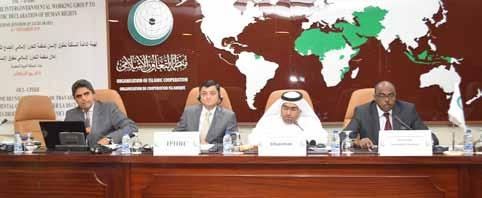
4 minute read
OIC Member States most affected by Climate Change, Least Liable
Al-Othaimeen: OIC Member States most affected by Climate Change, Least Liable
«Climate change has emerged as a serious threat to the lives of millions of people worldwide during the last few decades,» stated Dr. Yousef A. Al-Othaimeen, the Secretary-General of the Organization of Islamic Cooperation (OIC). This was part of his speech at the opening of the 16th Regular Session of the OIC Independent Permanent Commission for Human Rights (IPHRC) held at the IPHRC headquarters in Jeddah, Saudi Arabia, on Tuesday 26 November 2019. The theme of this Session, which is going on until 28 November 2019, is «Climate Change and Environmental Protection: a Human Rights Perspective». Delivered by Dr. Abdullah Al-Tayer, Director General of the Cabinet and Chief Adviser, on behalf of the OIC Secretary-General, the speech asserted that climate change poses an existential threat to communities given the increasing weather volatility, declining agricultural productivity, and the receding water levels and quality. Al-Othaimeen added that while the impact of the OIC Member States on global warming is minimal, they are among the most vulnerable to climate change, which is ascribable to their high dependence on high climate-sensitive natural resources and low adaptation capacities due to technological and financial impediments. The Secretary-General said that the melting of the icebergs and the increase in the levels of water above the sea level lead to a decrease in the area of land suitable for human habitation, and the negative effects resulting from the deterioration of the environment causing social and political problems, affecting the basic human rights, habitats and food security. He added that over the past few years, the international community has made rea
Advertisement
sonable progress in raising awareness and building consensus to deal with the negative effects of climate change. However, the Secretary General added that, it is disturbing that despite many international statements and pledges, it has not been possible to achieve global goals to reduce global warming, as developed countries, the largest source of harmful gas emissions, have failed to meet their obligations, and this has necessitated that developing countries bear a disproportionate burden of environmental degradation caused by uncontrolled consumption patterns, and greenhouse gases. The OIC Secretary-General also stated that the OIC Member States face various human rights challenges due to population growth, resource depletion, environmental degradation and climate change. Therefore, he pointed, environment conservation have become one of the priority issues on the OIC agenda. He drew the attention to the growing awareness among the OIC Member States of the need to combat the negative effects of environmental changes through the adoption of climate-friendly technologies and the promotion of international cooperation. The Organization of Islamic Cooperation, in cooperation with ISESCO, recently concluded the Eighth Islamic Conference of Environment Ministers, which emphasized, among other recommendations, the important role of cultural and religious factors in protecting the environment and achieving sustainable development. Al-Othaimeen said that there is an urgent need to develop an integrated policy of the Organization of Islamic Cooperation to raise awareness, interaction and cooperation on environmental issues between the countries of the organization, explaining that this requires the establishment of partnerships at the national, regional and organizational levels to support international sustainable development agenda. He also stressed the need to include field practitioners, researchers, scholars, policy-makers, and education communities, to fill knowledge and financing gaps. The Secretary General emphasized that this policy should cover all dimensions, including capacity building, disaster risk management, research, environmental impact assessment and economic diversification. The IPHRC 16th Regular Session witnessed the presence of representatives of the OIC Member States and Observer States, national human rights institutions of Member States, experts from various relevant international and regional organizations and media personnel. The agenda of then meeting featured issues of concern to civil, political, economic, social and cultural rights in the member states of the organization, and the violations of human rights in Palestine, Jammu and Kashmir. The commission also held regular meetings of the four working groups concerned with Palestine, the rights of women and children, Islamophobia and Muslim minorities, and the right to development, where decisions were taken on the plans of action for the commission. Draft Human Rights Declaration Discussed A two-day meeting of the Organization of Islamic Cooperation (OIC) Intergovernmental Group of Experts was held at the Jeddah based General Secretariat, on 6 through 7 November 2019, to review amendments to the declaration of human rights by the 57 OIC countries. The meeting reviewed the draft declaration on human rights by the OIC Independent Permanent Human Rights Commission. In an opening statement delivered at the meeting on his behalf by Assistant Secretary General for Humanitarian, Cultural and Social Affairs Ambassador Tarek Bakheet, Secretary General Dr Yousef Al-Othaimeen expressed appreciation to the member states for their effort to refine this treaty of human rights. He pointed out that the document will make an effective contribution to human rights promotion in OIC countries.










